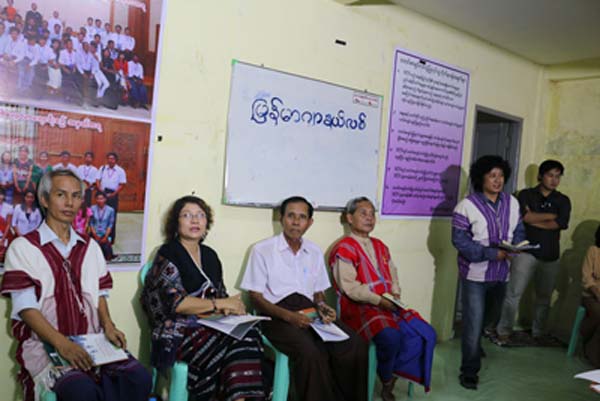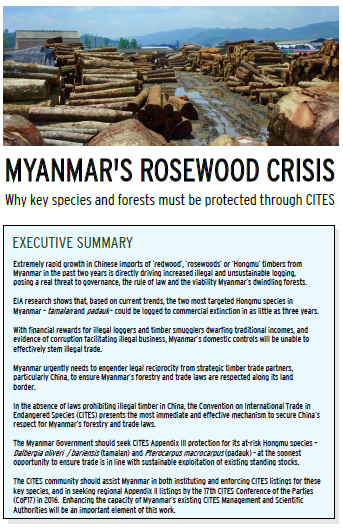Posts Tagged ‘Trade’ (8 found)
Karen Civil Society Rallies Around Japan’s Harmful Plans for Eastern Burma
 Japan’s lofty development plans for eastern Burma were very publicly rejected by the Karen Peace Support Network (KPSN) at a press conference in Rangoon, citing lack of consultation with communities and the potential for such plans to fuel conflict. Based on a blueprint for extensive development projects produced by the Japanese International Cooperation Agency (JICA), the overseas development arm of the Japanese government, 28 Karen civil society organizations that form the KPSN, released a report to outline their concerns and recommendations. JICA’s blueprint, in which its main goal is to support the return of refugees and internally displaced persons (IDPs), contains four main components; economic corridors, free trade zones and industrial estates, industrial clusters, and urban development. The Japanese government has been working closely with both the Union level and State level Burmese Government in the development of this plan.
Japan’s lofty development plans for eastern Burma were very publicly rejected by the Karen Peace Support Network (KPSN) at a press conference in Rangoon, citing lack of consultation with communities and the potential for such plans to fuel conflict. Based on a blueprint for extensive development projects produced by the Japanese International Cooperation Agency (JICA), the overseas development arm of the Japanese government, 28 Karen civil society organizations that form the KPSN, released a report to outline their concerns and recommendations. JICA’s blueprint, in which its main goal is to support the return of refugees and internally displaced persons (IDPs), contains four main components; economic corridors, free trade zones and industrial estates, industrial clusters, and urban development. The Japanese government has been working closely with both the Union level and State level Burmese Government in the development of this plan.
For Karen civil society, however, there are many concerns, as outlined in the report released on 9 September. Although the blueprint aims to “promote peace through development,” JICA has not conducted a conflict analysis on what is an extremely complicated and fragile context. In fact the plans could serve to exacerbate conflict by facilitating land confiscation, one of the loci of tension in the ceasefire process. Also, improving transport and road access to areas traditionally held by ethnic armed groups such as the Karen National Union (KNU), allows easy access for Burma Army soldiers to the heart of Karen areas. We must not forget the abusive nature of the Burma Army that has been terrorizing civilians for decades and continues to do so, despite a ceasefire in place. Will exposing more communities, who are already vulnerable to abuses, to the unreformed Burma Army really aid peace […]
• • •Myanmar’s Rosewood Crisis
Extremely rapid growth in Chinese imports of ‘redwood’, ‘rosewoods’ or ‘Hongmu’ timbers from Myanmar in the past two years is directly driving increased illegal and unsustainable logging, posing a real threat to governance, the rule of law and the viability Myanmar’s dwindling forests.
EIA research shows that, based on current trends, the two most targeted Hongmu species in Myanmar – tamalan and padauk – could be logged to commercial extinction in as little as three years.
With financial rewards for illegal loggers and timber smugglers dwarfing traditional incomes, and evidence of corruption facilitating illegal business, Myanmar’s domestic controls will be unable to effectively stem illegal trade.
Myanmar urgently needs to engender legal reciprocity from strategic timber trade partners, particularly China, to ensure Myanmar’s forestry and trade laws are respected along its land border […]
• • •Letter to President Obama on GSP Trade Benefits for Burma
Dear President Obama,
We are writing about the ongoing review to reinstate trade benefits for Burma under the Generalized System of Preferences (GSP). Promoting trade with Burma creates human rights risks, particularly in problem sectors such as extractive industries and plantation agriculture, that could undermine the careful economic reengagement policy your Administration has charted thus far. Therefore, if GSP benefits are restored to Burma, we urge your Administration to take the steps outlined in this letter to manage the human rights impacts of that decision […]
• •EU Restoration of Myanmar Preferential Trade Regime: Neglect of Human Rights Concerns?
On 19 July 2013, the European Union brought Myanmar back into the so-called “Everything but Arms” regime, a preferential trade regime within the “Generalised Scheme of Preferences”. Although the EU claims this decision will facilitate the country’s path to democracy and development, it has been strongly criticised by numerous human rights organisations […]
• • •Council Conclusions on the Comprehensive Framework for the European Union’s Policy and Support to Myanmar/Burma
The Council adopted the following conclusions:
“The Council welcomes and endorses the attached Comprehensive Framework consisting of priorities for the European Union’s policy and support in the next three years to the on-going reforms in Myanmar/Burma. This Framework sets forth EU’s goals and priorities geared towards building a lasting partnership and promoting closer engagement with the country as a whole […]
• • •Alternative Trade Groups on ASEAN Economic Integration in 2015: “A Hazy Future for the People”
Two years before the economic integration of the Southeast Asian economies, critics of neoliberal policies and the current global trade and investment regime, alternative trade campaigners and human rights activists raised concerns over the existing trade and investment policies in the Association of Southeast Asian Nations (ASEAN) and its member-governments and the effects of these policies to the peoples and communities in the region […]
• • •Joint Statement on Investment and Trade in Burma
With many sanctions against the military-backed government in Burma in the process of being suspended or lifted, there is intense interest from European companies in investing and trading with Burma […]
• • •Japan: Press Burma’s Foreign Minister on Rights
Political Prisoners, Not Just Aid and Trade, Should Top Agenda
Japanese officials should press Burma’s visiting foreign minister on the need for genuine reforms to improve human rights in Burma, Human Rights Watch said today. Foreign Minister Wunna Maung Lwin will visit Tokyo from October 20 to 22, 2011.
Wunna Maung Lwin’s visit to Japan is the first by a foreign minister from Burma in 16 years. His meetings with Japanese officials are expected to include discussion of increased development assistance and possible trade agreements […]
• • •









 All posts
All posts